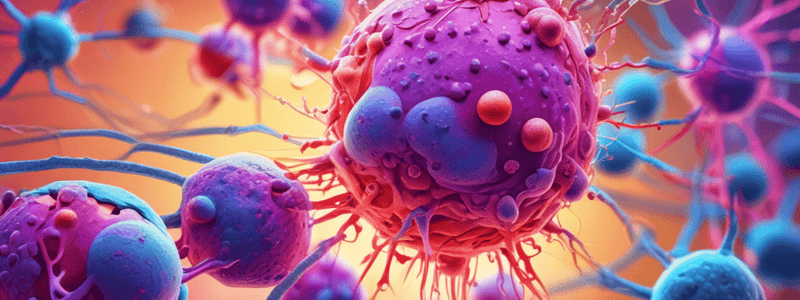Podcast
Questions and Answers
Was ist die primäre Verteidigungslinie des Körpers gegen Infektionen?
Was ist die primäre Verteidigungslinie des Körpers gegen Infektionen?
- Haut und Schleimhäute (correct)
- Adaptive Immunität
- Phagozyten
- T-Lymphozyten
Welches Immunsystem ist angeboren und nicht spezifisch gegen bestimmte Erreger?
Welches Immunsystem ist angeboren und nicht spezifisch gegen bestimmte Erreger?
- Adaptive Immunität
- Makrophagen (correct)
- T-Lymphozyten
- B-Zellen
Welche Art von Immunität entwickelt sich im Laufe der Zeit als Reaktion auf spezifische Erreger?
Welche Art von Immunität entwickelt sich im Laufe der Zeit als Reaktion auf spezifische Erreger?
- Histaminfreisetzung
- Innate Immunität (correct)
- B-Lymphozyten
- Mastzellen
Welche Zellen erkennen und neutralisieren spezifische Pathogene im Immunsystem?
Welche Zellen erkennen und neutralisieren spezifische Pathogene im Immunsystem?
Welche Zellen setzen Histamin frei, um entzündliche Reaktionen zu triggern und Pathogene zu entfernen?
Welche Zellen setzen Histamin frei, um entzündliche Reaktionen zu triggern und Pathogene zu entfernen?
Welches Immunsystem bietet unmittelbaren Schutz ohne vorherige Exposition gegenüber einem Erreger?
Welches Immunsystem bietet unmittelbaren Schutz ohne vorherige Exposition gegenüber einem Erreger?
Was sind Antikörper und welche Funktion haben sie?
Was sind Antikörper und welche Funktion haben sie?
Welche Art von Immunität bietet sofortigen Schutz, ohne dass der Einzelne eine langfristige Immunantwort entwickelt?
Welche Art von Immunität bietet sofortigen Schutz, ohne dass der Einzelne eine langfristige Immunantwort entwickelt?
Was sind Lymphozyten und welche Rolle spielen sie im Immunsystem?
Was sind Lymphozyten und welche Rolle spielen sie im Immunsystem?
Was ist ein Merkmal der passiven Immunität?
Was ist ein Merkmal der passiven Immunität?
Welche Rolle spielen Neutrophile im Immunsystem?
Welche Rolle spielen Neutrophile im Immunsystem?
Was kennzeichnet die adaptive Immunität im Vergleich zur angeborenen Immunität?
Was kennzeichnet die adaptive Immunität im Vergleich zur angeborenen Immunität?
Flashcards are hidden until you start studying
Study Notes
The Immune System: Understanding Innate and Adaptive Immunity, Immune Response, Immune Cells, and Antibodies
The immune system is a complex network of cells, tissues, proteins, and organs that protects the human body from various pathogens, including bacteria, viruses, parasites, and toxins. It is our body's first line of defense against infections, ensuring that we stay healthy and maintain optimal health. The immune system can be divided into two main categories: innate and adaptive immunity.
Innate Immunity
Innate immunity is the primary defense mechanism that humans are born with. It involves non-specific responses to various pathogens, providing immediate protection without any prior exposure or experience. Innate immunity includes physical barriers such as skin and mucous membranes, which prevent pathogens from entering the body. It also includes various immune cells, such as phagocytes (like macrophages) that engulf and destroy pathogens, and mast cells, which release histamine to trigger inflammatory responses to remove pathogens.
Adaptive (Acquired) Immunity
Adaptive immunity develops over time as a result of exposure to specific pathogens or through vaccinations. It involves a more specific response to pathogens by generating antigen-specific immune cells, such as B-lymphocytes and T-lymphocytes, which recognize and neutralize the pathogens. Adaptive immunity also involves the production of antibodies, which are proteins that recognize and bind to specific pathogens, marking them for destruction by other immune cells. This process allows the immune system to remember the specific pathogen and respond more effectively if it is encountered again in the future.
Immune Response
The immune response is the complex series of events that occur when the immune system encounters a foreign pathogen or antigen. It involves a coordinated effort between various immune cells, such as phagocytes, lymphocytes, and antibodies, to recognize, neutralize, and eliminate the pathogen. The immune response can be further divided into acute and chronic phases, depending on the nature of the infection and the body's ability to effectively clear the pathogen.
Immune Cells
White Blood Cells (Leukocytes)
White blood cells, or leukocytes, are a diverse group of immune cells that play a crucial role in defending the body against infections. They are produced in the bone marrow and circulate in the blood and lymphatic system. Some of the key types of white blood cells include neutrophils, which are involved in phagocytosis; lymphocytes, which are involved in adaptive immunity; and eosinophils, which help in the removal of parasites.
Lymphocytes
Lymphocytes are a type of white blood cell that plays a central role in adaptive immunity. They can be further divided into B-lymphocytes, which produce antibodies, and T-lymphocytes, which have different functions, including regulatory and cytotoxic roles.
Antibodies
Antibodies are proteins produced by B-lymphocytes in response to an antigen. They recognize and bind to specific antigens on the surface of pathogens, marking them for destruction by other immune cells. Antibodies can neutralize pathogens by preventing them from infecting cells, or by marking them for phagocytosis by macrophages.
Passive Immunity
Passive immunity is a temporary form of immunity that provides immediate protection without the individual developing a long-term immune response. It can be transferred from one individual to another, such as from a mother to her baby through breast milk or the placenta. Passive immunity can also be administered through the injection of pre-formed antibodies, such as in the case of immunoglobulin therapy for immunocompromised individuals or as a post-exposure prophylaxis against certain infections.
The immune system is a complex network of cells, tissues, proteins, and organs that work together to protect the body from pathogens. Understanding how the immune system functions, its various components, and the role of innate and adaptive immunity is crucial for maintaining optimal health and well-being.
Studying That Suits You
Use AI to generate personalized quizzes and flashcards to suit your learning preferences.




